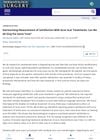Search
forProducts matching "l oreal"
Tracking 2 products like 37 Serioxyl and 188 L’Oréal Professionnel Aminexil 1.5% Advanced Anti-Hair Loss Programme from by companies like Walmart and ZeeMoreUncle. View all 2 products »
Sort by
Research
240-270 / 1000+ results
research Harmonizing Measurement of Satisfaction With Acne Scar Treatments: Can We All Sing the Same Tune?
Researchers suggest using a standard question and 5-point scale to measure patient satisfaction with acne scar treatments.
research Assessing the Effect of Cleansing Products on Artificially Polluted Human Hairs and Skin Through In Vivo and In Vitro Models
research The Importance of Natural Products in Cosmetics
Natural products like coconut oil and aloe vera are beneficial in cosmetics for their healing properties.

research Human Hair Follicle Stem/Progenitor Cells Express Hypoxia Markers
Human hair follicle stem cells show signs of low oxygen levels, which may be important for hair growth and preventing baldness.

research Current Advances of Nanocarrier Technology-Based Active Cosmetic Ingredients for Beauty Applications
Nanocarrier technology in cosmetics improves ingredient delivery and effectiveness while reducing side effects.

research Nanomaterials in Hair Care and Treatment
Nanomaterials can improve hair care products and treatments, including hair loss and alopecia, by enhancing stability and safety, and allowing controlled release of compounds, but their safety in cosmetics needs more understanding.

research Efficacy of Imiquimod 5% Cream in the Treatment of Equine Sarcoids: A Pilot Study
Imiquimod 5% cream reduced equine sarcoids in most cases.

research Becker's Nevus Associated with Chromosomal Mosaicism and Congenital Adrenal Hyperplasia
High androgen levels and genetic factors likely cause Becker's nevus and related symptoms.

research Redefining Hormone Resistance in Prostate Cancer
The conclusion suggests that prostate cancer should be classified by castration status and that new therapies targeting androgen receptor signaling show promise.
research Shock: A Possible Presenting Manifestation of Autoimmune Polyendocrine Syndrome Type II
Shock can be an early sign of Autoimmune Polyendocrine Syndrome Type II.

research A Systematic Review on Topical Marketed Formulations, Natural Products, and Oral Supplements to Prevent Androgenic Alopecia
Various treatments, including FDA-approved drugs, natural products, and oral supplements, can help with hair loss, but a patient's medical history and potential allergies should be considered when choosing a treatment.

research L-Carnitine-L-Tartrate Promotes Human Hair Growth In Vitro
L-Carnitine-L-tartrate may help hair grow and prevent hair loss.

research A Case of Folliculitis Decalvans With Concomitant Acne Keloidalis Nuchae, Androgenic Alopecia, and Profound Postinflammatory Hyperpigmentation
A 37-year-old man with hair loss and skin issues was successfully treated with oral antibiotics, highlighting the need for early treatment. Long-term care includes low-dose antibiotics and avoiding caps and wigs.
research Topical Finasteride Dose Evaluation for Treatment of Androgenetic Alopecia Using Computer Simulations
Topical finasteride at 0.25% is effective and has fewer side effects than oral finasteride for hair loss.

research Riboflavin-Responsive Glutaryl CoA Dehydrogenase Deficiency
Taking riboflavin and eating less lysine can help some people with a specific genetic disorder avoid brain damage.

research Folliculitis Decalvans: A Rare Inflammatory Scalp Disorder
Folliculitis decalvans is a rare scalp condition causing scarring hair loss, treated with long-term antibiotics and other medications, but it often comes back and is hard to manage.

research Management of Primary Cicatricial Alopecias: Options for Treatment
There are many treatments for permanent hair loss disorders, but their effectiveness varies and there's no clear best option.

research Iron Deficiency and Diffuse Nonscarring Scalp Alopecia in Women: More Pieces to the Puzzle
The conclusion suggests a possible link between iron levels and hair health in women, recommending further research on iron supplementation for hair loss.

research Dermatologic Therapy: December 1986 to December 1987
Various dermatologic treatments were effective for skin conditions like acne, rosacea, hair loss, and psoriasis from December 1986 to December 1987.

research Probiotic Bacteria Induce a Glow of Health
Probiotic bacteria improved skin and hair health in aged mice.
research The Potential Teeth Bleaching and Halitosis Prevention Effects of Pediococcus Inopinatus THK-30, a Kimchi-Derived Lactic Acid Bacterium: An In Vitro Study
A kimchi-derived bacterium could help whiten teeth and prevent bad breath.

research Levodopa-Induced Skin Disorders in Patients with Parkinson's Disease: A Systematic Literature Review
Levodopa for Parkinson's disease might be linked to skin issues like melanoma, but it's unclear if the drug or the disease causes them.

research Lifestyle Changes in Women with Polycystic Ovary Syndrome
Lifestyle changes can improve body composition, excess male hormone levels, and insulin resistance in women with PCOS.

research Neurosteroids, Neuroactive Steroids, and Symptoms of Affective Disorders
Certain steroids in the brain affect mood and symptoms of depression, and treatments targeting these steroids show promise for improving these symptoms.

research Complementary and Alternative Treatments for Alopecia: A Comprehensive Review
Some alternative treatments for hair loss might work, but more research is needed.

research Primary Cicatricial Alopecia
The document concludes that early recognition and treatment of primary cicatricial alopecia is crucial to prevent permanent hair loss.

research How to Diagnose a Lipodystrophy Syndrome
The document concludes that recognizing and properly diagnosing lipodystrophy syndromes is crucial for effective management and treatment.

research The Pharmacologic Treatment of Muscle Pain
The document concludes that more research is needed to understand how to treat muscle pain with drugs.

research Cicatricial Alopecia: Overview and Treatment Recommendations
Permanent hair loss from cicatricial alopecia is treated by reducing inflammation and managing symptoms, but regrowth in scarred areas is unlikely.